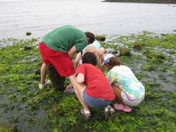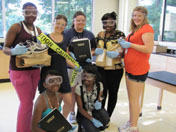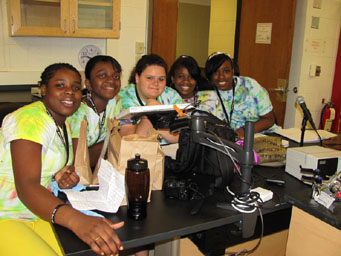BASE Camp 2010
Broadening Access to Science
Education
July 11-16, 2010
Fairfield University
Funding for the 2010 program was generously provided through grants by Bank of America and the Maximilian E. and Marion O. Hoffman Foundation. We are grateful to them for making this experience possible for these students. We hope that this opportunity will encourage interest in the pursuit of science at the college level.
The one-week overnight camp is free of charge to students. All meals and lodging on campus are included. Students arrived on Sunday afternoon and will live in one of the campus dormitories for the week.
Each day of the week, students worded in small groups on a specific research project to which they have been assigned. Projects were led by Fairfield University faculty with assistance from current undergraduate students. Each project is designed to expose students to important topics in science, experimental design, current research methodology, and data analysis. In the evenings, students were provided opportunities to interacte with undergraduates and participate in fun activities.


At the end of the week, student groups presented their research findings to camp participants and their families/friends. Campers received certificates of participation for their involvement in the camp.
The Projects
Project #1 - Investigating Marine "Invasions"
in Long Island
Diane Brousseau, PhD - Department of Biology
Laura McSweeney, PhD - Department of Mathematics and Computer Science
This marine biology field project will study the ecology of the Asian
shore crab, a non-native species that "invaded" Long Island
Sound in the 1990's. Students will use mark-recapture techniques to generate
crab mobility data for analysis. Part of the day will be spent along the
shores of Long Island Sound collecting, releasing and recapturing crabs
they have tagged and measured in the laboratory. Students will analyze
the data they collected using graphical summaries and statistical hypothesis
testing.
Project #2 - Forensic Science
Amanda Harper-Leatherman, PhD - Department of Chemistry
Forensic Science is the application of science to help solve crime. In
this project, students will become crime scene investigators charged with
the task of solving a 'crime' using experimental lab skills and critical
thinking skills. We will explore and use specific scientific techniques
for the analysis of crime scene physical evidence such as plastics, fabrics,
oils, arson accelerants, fingerprints, and/or blood.

Project #3 - An Introduction to Species
Identification
Ashley Byun-McKay, PhD - Department of Biology
Species identification is of particular importance today as issues like
deforestation and global warming continue to threaten biodiversity and
ultimately disrupt the ecosystems necessary for viability of life on earth.
In this exercise, we will be learning about some of the tools for species
identification including DNA sequencing. Students will be in the field
doing collections, in the lab identifying species using morphology (physical
traits) and also learning to use molecular tools and DNA databases to
identify local species around Connecticut.
Project #4 - How Does Exposure to Hormones
Early In Life Shape the Brain?
Shannon Harding, PhD - Department of Psychology
Students will spend the mornings investigating the field of psychology
and the structure of the human brain, focusing on differences between
males and females. Students will get "hands-on" experience with
real specimens from humans and sheep. In the afternoon, we will look at
gender differences in learning using young male and female rats as test
subjects. Among other things, we will explore the different types of memory
and the innovative tests that behavioral neuroscientists have developed
to study them.
Project #5 - Testing Anti-Cancer Compounds
on Human Leukemia Cells
Shelley Phelan, PhD - Department of Biology
Cancerous cells have the ability to grow continuously without the proper
cellular restraints. This research project will allow students to work
with an established human leukemia cell line and learn how to grow these
cells in the laboratory. Students will examine various properties of cancer
cells, test the effectiveness of different compounds on cancer cell growth,
and measure the expression of particular cancer related genes.
Project #6 - Medicinal Chemistry Investigation
Into Crohn's Disease
Jessica Davis, PhD - Department of Chemistry
Crohn's disease is an autoimmune disease that causes inflammation of the
gastrointestinal tract. The symptoms include severe discomfort, malnutrition,
and can lead to colon cancer. Current therapies of Crohn's disease have
serious limitations and more drug-like therapeutics are needed. This project
targets a key biomolecular interaction involved in Crohn's disease. Students
will have the opportunity to screen small molecule inhibitors of this
key interaction in an attempt to discover more drug-like molecules to
combat Crohn's disease.
The Poster Session
The week ended with each group presenting their research at a poster session.
Family, friends, fellow students and faculty from the high schools and Fairfield University attended to hear about what the students accomplished during the week and to enjoy refreshments.
Fairfield University Biology Department
1073 North Benson Road
Fairfield, CT 06824
(203)254-4000
© 2007– Fairfield University